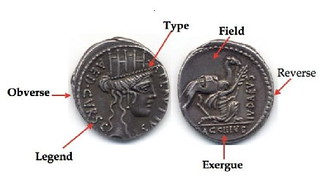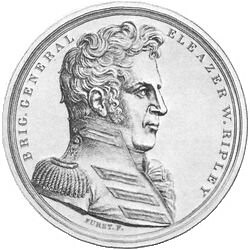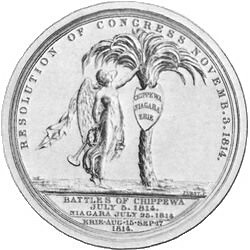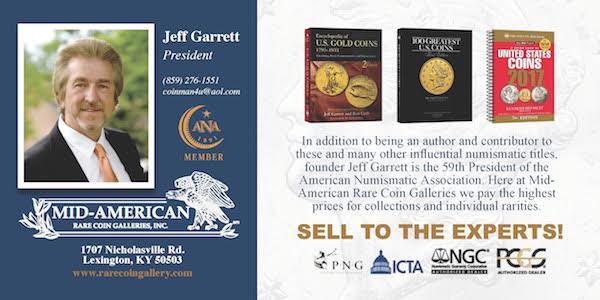
PREV ARTICLE
NEXT ARTICLE
FULL ISSUE
PREV FULL ISSUE
VOCABULARY TERMS: EXERGUEDick Johnson submitted this entry from his Encyclopedia of Coin and Medal Terminology. Thanks. -Editor
 Exergue. The segment of a coin or medal design beneath a base line, usually containing lettering. While exergue means the area beneath the base line, by extension it also means the lettering within this area. Designing any scene or illustration with a ground line and placing this in a circular shape gives rise to the area so described. From almost the beginning of the Renaissance medal, the exergue was being used. It was a logical place to put additional information: signatures, dates, mottos, inscriptions and such, some lines in smaller letters than others for variety. Only in rare instances was any ornamentation placed there, so important was it for lettering. An exergue can only exist on a circular or rounded bottom; if the area has square corners the lower portion is a PLINTH. See PANEL. History of exergue. The earliest art medals of the Renaissance exhibit exergues. The dual portrait medal of Rene d' Anjou and Jeanne de Laval (Kress 24), dated 1463, contains an exergue on the reverse containing the artist's name: FRANCISCVS LAVRANA / FECIT in two lines beneath the base line of Peace standing next to an olive tree. The use of an exergue continued in medallic art from that time forwards. The first coin designed with an exergue may have been a coin of Charles II, a halfpenny of 1673. The design of the seated Britannia obviously had a base line, but this was extended across the full flan on this coin with the 1673 date below in the exergue. The first use of the term, at least in English, was shortly thereafter, in 1697. It is widely used in numismatic cataloging. A supraexergue is a similar area at the top of a design – as on a circular or oval medal – with a line across the top of the device creating an area above for lettering or symbols. The reverse of the United States oval Indian Peace medal series has such a supraexergue. A bowed exergue was created for a Columbus medal of 1892; it showed the Landing of Columbus as a scene on the reverse and the design lends itself to a base that is an arc rather than a straight line. The lettering in the exergue is on a bowed base line congruent with the bowed truncation of the device. A double exergue exists on a U.S. Mint medal, the Eleeazer Wheelock Ripley Medal of 1826, where a question of fact was raised to correct lettering already cut into this area (had Ripley indeed participated in the Battle of Erie, September 17, 1814?). When the correct information was furnished engraver Moritz Furst, he placed it on a higher plane than the rest of the exergue, creating the double exergue. [The author suspects he did this to save an already completed die without having to cut a new reverse die.] CLASS 02.4 I was unaware of the double exergue and found this illustration of the Ripley medal. -Editor
  To read the complete article, see: Looking for the meaning of a numismatic word, or the description of a term? Try the Newman Numismatic Portal's Numismatic Dictionary at: https://nnp.wustl.edu/library/dictionary Or if you would like a printed copy of the complete Encyclopedia, it is available. There are 1,854 terms, on 678 pages, in The Encyclopedia of Coin and Medal Technology. Even running two a week would require more than 19 years to publish them all. If you would like an advance draft of this vital reference work it may be obtained from the author for your check of $50 sent postpaid. Dick Johnson, 139 Thompson Drive, Torrington, CT 06790.  Wayne Homren, Editor The Numismatic Bibliomania Society is a non-profit organization promoting numismatic literature. See our web site at coinbooks.org. To submit items for publication in The E-Sylum, write to the Editor at this address: whomren@gmail.com To subscribe go to: https://my.binhost.com/lists/listinfo/esylum All Rights Reserved. NBS Home Page Contact the NBS webmaster 
|